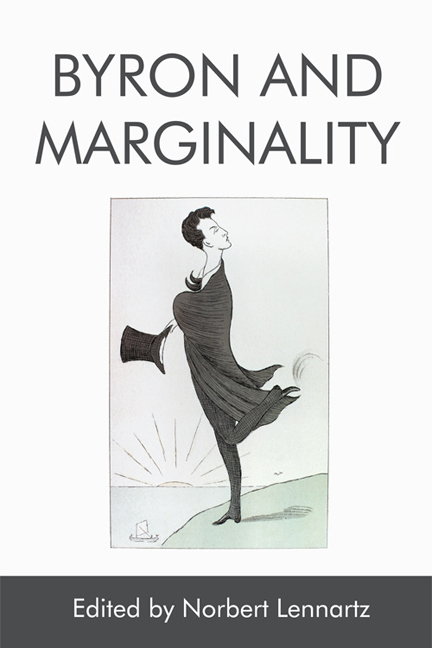Book contents
- Frontmatter
- Contents
- Foreword
- Acknowledgements
- Editions and Abbreviations
- 1 Lord Byron, Wandering and Wavering between the Centres and Margins of Romanticism: An Attempt at an Introduction
- I Byron’s Marginalisation in Romantic World Literature
- II Byron’s Marginal Identities and Places
- III Cherishing the Marginal – Marginal Genres in Byron
- IV On the Provocative Margins of Taste
- V Marginal Affairs – Visual and Paratextual Aspects in Byron
- List of Contributors
- Index
9 - Out of Romanticism: Byron and Romance
Published online by Cambridge University Press: 06 May 2021
- Frontmatter
- Contents
- Foreword
- Acknowledgements
- Editions and Abbreviations
- 1 Lord Byron, Wandering and Wavering between the Centres and Margins of Romanticism: An Attempt at an Introduction
- I Byron’s Marginalisation in Romantic World Literature
- II Byron’s Marginal Identities and Places
- III Cherishing the Marginal – Marginal Genres in Byron
- IV On the Provocative Margins of Taste
- V Marginal Affairs – Visual and Paratextual Aspects in Byron
- List of Contributors
- Index
Summary
That Byron's poetry is often considered to stand at the margins of Romanticism is in part the result of generic association. Byron excelled at satire. His magnum opus, Don Juan (1819–24), while perilous to categorise (epic, mock-epic, anti-epic, novel?), is safe to read as a satirical poem. Satire relies upon the sociability of the poet and the reader. From Juvenal and Horace, to Dryden and Pope, and thence to Byron, satire manages at once to be gregarious in tone whilst antisocial in its antagonistic content. In such comic (anti) sociability, satire – and Byron – can be seen to stand at odds with the serious and solitary genre of lyric, and it is that which has come to be seen as the defining genre of what modern scholars and university syllabi now confidently label ‘Romanticism’. Lyric, like the Romantic poet-hero, emerges from the private, the contemplative and the confessional state. With the lyric mode standing pre eminent in the dominant critical narrative of Romanticism, the satirically minded Byron has been understandably marginalised, yet there are fundamental inaccuracies with this popular story. Most obviously, sidelining Byron in discussions of Romantic lyricism overlooks Byron's considerable lyric output. All four of his Juvenalian collections are comprised exclusively of lyric poetry (with the exceptions of various school-translation exercises from Greek and Latin). At the height of his fame, Byron published the Hebrew Melodies (1815), the contents of which were not simply lyric in form but intended to be sung, being initially bound with musical settings by Isaac Nathan. Byron's lyric practice was central to his eventual success in the ottava rima, a stanza form with which he first experiments in his lyric ‘Epistle to Augusta’ (1816), and this poetic debt to lyric is evident in both of his long poems. Childe Harold's Pilgrimage (1812–18) and Don Juan (1819–24) each offer instances of lyric interruption. One way of underscoring the erroneous marginalisation of Byron from what may be deemed Wordsworthian Romanticism is to explore Byron's little attended-to lyrics. Another way, however, is to challenge the relatively narrow generic classification with which we have tended to conceptualise Romanticism.
- Type
- Chapter
- Information
- Byron and Marginality , pp. 166 - 185Publisher: Edinburgh University PressPrint publication year: 2018



